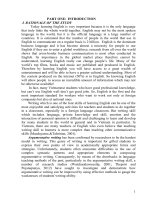Writing task 2 9.0 9999 fixed punishments for certain crimes
Bạn đang xem bản rút gọn của tài liệu. Xem và tải ngay bản đầy đủ của tài liệu tại đây (180.55 KB, 7 trang )
Overall band score
9
9+9+9+9
See below C&C LR GRA
Model answer
WRITING TASK 2
You should spend about 40 minutes on this task.
Write about the following topic:
Some people believe that there should be a fixed punishment for each type of
crime. Others, however, argue that the circumstances of an individual crime,
and the motivation for committing it, should always be taken into account when
deciding on the punishment.
Discuss both views and give your own opinion.
Give reasons for your answer and include any relevant examples from your own
knowledge or experience.
Write at least 250 words.
Original answer Some people hold the belief that the government should implement a
standardized punishment for every offender of a particular crime. While there are
good grounds for advocating this proposal, I would argue that punishment should
be tailored to the case.
Granted, proponents of uniform punishment might argue that they are necessary
for consistency and fairness in the justice system. Every transgression, they say,
should have a clear and predefined punishment, so that everyone knows what to
expect if they commit an unlawful act. Not only would this simplify the procedure
of administering justice, but it could also minimize the risk of bias or
discrimination. For example, in many nations, the penalty for driving under the
influence of alcohol is a fixed fine and license suspension, regardless of the
circumstances of the offense. This makes the process of meting out punishment
for drunk drivers there fast and fair for everyone.
Notwithstanding, I am convinced that the situation behind crimes varies from
case to case, so punishment should be proportionate to the motivation for the
crime, the severity of the offense, and the offender's personal circumstances. To
illustrate, a first-time offender who steals to feed their family should deserve a
lighter sentence than one who repeatedly steals for personal gain. By the same
token, the punishment for a crime committed in self-defense should be different
than that for one with premeditation. Were universal punishment applied to such
cases, I feel it would be rather unjust and inhumane.
To summarize, while fixed punishments have certain benefits, I side with
opponents of this one-size-fit-all approach, believing that an equitable legal
system should take into account the special aspects of each individual case.
Overall band score
9
9+9+9+9
TR – Task Response nb – GRA and LR errors have not been corrected
Band score 9
Excellent answer.
You have a clear position throughout and all parts of the question are addressed.
Your position is coherent and well-argued. The ideas are relevant, extended, and
coherent.
Another argument for fixed punishments is that there are often stories in the
media about criminals getting lenient sentences, which enrages the public
(according to the tabloids). Fixed punishments would limit judges in their
freedom to give excessively lenient or harsh sentences.
Another approach would be to say the proposal would work for less serious
crimes that don’t carry a custodial sentence, but for more serious crimes, such as
those involving violence or offences against property, it makes sense to weigh up
the attenuating or aggravating circumstances.
Advice On Brainstorming For Task 2
As you’re planning and writing your answer, remember to constantly
ask yourself if you’re answering the question. Check back to the
question a few times as you think of ideas to make sure they're
directly relevant.
Make sure your introduction directly addresses the
question.
Make sure your ideas address all parts of the question. If
the question asks for solutions, in the plural, you must
suggest at least 2.
Make sure your main ideas, as stated in the first sentence
of the main body paragraphs, are directly relevant to the
question.
Make sure your supporting ideas, which follow the main
ideas in the main body paragraphs, directly support the
main idea.
Be especially careful if you’ve answered similar question
before, as there will always be important differences.
Make sure your conclusion directly answers the question,
that it is consistent with the ideas in the main bodies, and
that it does not contradict the introduction.
Some people hold the belief that the government should implement a
standardized punishment for every offender of a particular crime. While there are
good grounds for advocating this proposal, I would argue that punishment should
be tailored to the case.[a]
Granted, proponents of uniform punishment might argue that they are necessary
for consistency and fairness in the justice system. [b]Every transgression, they say,
should have a clear and predefined punishment, so that everyone knows what to
expect if they commit an unlawful act. Not only would this simplify the procedure
of administering justice, but it could also minimize the risk of bias or
discrimination. For example, in many nations, the penalty for driving under the
influence of alcohol is a fixed fine and license suspension, regardless of the
circumstances of the offense. This makes the process of meting out punishment
for drunk drivers there fast and fair for everyone.[c]
Notwithstanding, I am convinced that the situation behind crimes varies from
case to case, so punishment should be proportionate to the motivation for the
crime, the severity of the offense, and the offender's personal circumstances [d]. To
illustrate, a first-time offender who steals to feed their family should deserve a
lighter sentence than one who repeatedly steals for personal gain. By the same
token, the punishment for a crime committed in self-defense should be different
than that for one with premeditation. Were universal punishment applied to such
cases, I feel it would be rather unjust and inhumane.[e]
To summarize, while fixed punishments have certain benefits[f], I side with
opponents of this one-size-fit-all approach, believing that an equitable legal
system should take into account the special aspects of each individual case. [g]
C&C - Cohesion and Coherence nb GRA and LR errors have not been corrected
Band score 9
The organisation is excellent and easy to follow.
Use of cohesive devices and referencing is excellent throughout.
Paragraphing for Task 2
I recommend you write 4 paragraphs as follows:
Write an introduction, that explains what the question is.
After reading the introduction, the reader should have a
good idea what the essay is about, and what your position
(opinion) is. It should be possible to write an introduction in
under 50 words. It is not necessary to write a long
background statement.
Write 2 main body paragraphs. This should allow you to
expand on the ideas sufficiently to persuade the examiner
that you’ve fully supported the main ideas. If you write 3
main bodies, it is more difficult to expand and support them
sufficiently to get a high score.
If it’s a two-part question, answer the questions in the order
they’re given and write one paragraph per question.
The main body paragraphs should be 100-120 words, and
each paragraph should have a clear topic sentence and 2 or
more supporting ideas which support the topic sentence with
reasons, evidence, and examples. Do not waste time with
lots of background information.
The topic sentences should directly address the question.
The conclusion should be consistent with the introduction
and the main ideas, and it should not introduce new ideas. It
should directly answer the question. Do not leave the
examiner in any doubt about whether you’ve answered the
question.
If you write a third paragraph in a discuss both sides question
to clarify your position, make sure that give a good reason to
reject one of the sides. If you just restated the original ideas
about one side, the examiner may decide you have covered
one side more than the other.
It is also ok to write a third body paragraph in a to what
extent question if you have main ideas which both agree and
disagree with the proposition. Avoid short paragraphs, with
under 70 words, as it may be difficult to show a clear central
topic in a short paragraph.
Some people hold the belief that the government should implement a
standardized punishment for every offender of a particular crime. While there are
good grounds for advocating this proposal[h], I would argue that punishment
should be tailored to the case[i].
Granted, proponents of uniform punishment [j]might argue that they are
necessary for consistency and fairness in the justice system. [k]Every transgression,
they say[l], should have a clear and predefined punishment, so that everyone
knows what to expect if they commit an unlawful act. Not only would this simplify
the procedure of administering justice, but it could also [m]minimize the risk of bias
or discrimination. For example, in many nations, the penalty for driving under the
influence of alcohol is a fixed fine and license suspension, regardless of the
circumstances of the offense. This makes the process [n]of meting out punishment
for drunk drivers there fast and fair for everyone.
Notwithstanding, I am convinced that the situation behind crimes varies from
case to case, so punishment should be proportionate to the motivation for the
crime, the severity of the offense, and the offender's personal circumstances. [o]To
illustrate, a first-time offender who steals to feed their family should deserve a
lighter sentence than one who repeatedly steals for personal gain[p]. By the same
token[q], the punishment for a crime committed in self-defense should be different
than that for one with premeditation. Were universal punishment applied to such
cases, I feel it would be rather unjust and inhumane[r].
To summarize, while fixed punishments have certain benefits, [s]I side with
opponents of this one-size-fit-all approach, believing that an equitable legal
system should take into account the special aspects of each individual case.
LR- - Lexical resource nb Some GRA errors have not been corrected
Band score 9
Vocabulary is used accurately with sufficient flexibility to show precise meaning,
with a wide variety of vocabulary, used accurately and with a high level of control.
Some people hold the belief that [t]the government should implement a
standardized punishment for every offender of a particular crime[u]. While there
are good grounds for advocating [v]this proposal, I would argue that punishment
should be tailored to the case.
Granted, proponents of uniform punishment might argue that they are necessary
for consistency and fairness in the justice system. Every transgression, they say,
should have a clear and predefined punishment, so that everyone knows what to
expect if they commit an unlawful act[w]. Not only would this simplify the
procedure of administering justice, but it could also minimize the risk of bias or
discrimination. For example, in many nations, the penalty for driving under the
influence of alcohol is a fixed fine and license suspension, regardless of the
circumstances of the offense. This makes the process of meting out punishment
for drunk [x]drivers there fast and fair for everyone.
Notwithstanding, I am convinced that the situation behind crimes varies from
case to case, so punishment should be proportionate to the motivation for the
crime, the severity of the offense, and the offender's personal circumstances. To
illustrate, a first-time offender [y]who steals to feed their family should deserve a
lighter sentence than one who repeatedly steals for personal gain. By the same
token, the punishment for a crime committed in self-defense should be
different than [z]that for one with premeditation. Were universal punishment
applied to such cases, I feel it would be rather unjust and inhumane.
To summarize, while fixed punishments have certain benefits[aa], I side with
opponents of this one-size-fit-all approach, believing that an equitable [ab]legal
system should take into account the special aspects of each individual case.
GRA – Grammatical range and accuracy nb Some LR errors have
not been corrected
Band score 9
Grammar is used accurately with a wide variety of structures, which should be
good for a band score 9.
Punctuation is used correctly throughout.
Appropriate structures are used throughout.
Some people hold the belief that the government should implement a
standardized punishment for every offender of a particular crime. While there are
good grounds for advocating this proposal, I would argue that punishment should
be tailored to the case.
Granted, proponents of uniform punishment might argue that they [ac]are
necessary for consistency and fairness in the justice system. Every transgression,
they say, should have a clear and predefined punishment, so that everyone knows
what to expect if they commit an unlawful act. Not only would this simplify the
procedure of administering justice, but it could [ad]also minimize the risk of bias or
discrimination. For example, in many nations, the penalty for driving under the
influence of alcohol is a fixed fine and license suspension, regardless of the
circumstances of the offense. This makes the process of meting out punishment
for drunk drivers there fast and fair for everyone.
Notwithstanding[ae], I am convinced that the situation behind crimes varies from
case to case, so punishment should be proportionate to the motivation for the
crime, the severity of the offense, and the offender's personal circumstances. To
illustrate, a first-time offender who steals to feed their family should deserve a
lighter sentence than one who repeatedly steals for personal gain. By the same
token, the punishment for a crime committed in self-defense should be different
than that for one with premeditation. Were universal punishment applied to such
cases, I feel it would be rather unjust and inhumane.
To summarize, while fixed punishments have certain benefits, I side with
opponents of this one-size-fit-all approach, believing that an equitable legal
system should take into account the special aspects of each individual case.









